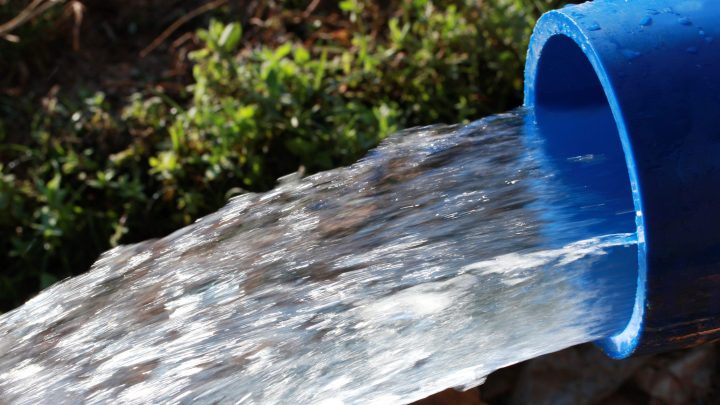
Federal “Buy American” rules could be stalling infrastructure projects
Federal “Buy American” rules could be stalling infrastructure projects

On an August day outside Sacaton, the capital of the Gila River Indian Community, a construction crew was digging a trench. Lengths of bright blue pipe, 4 feet in diameter, were piled up on the work site.
“What you see going on right now is the excavator is excavating the trench for the pipe. We’re putting in about 250 feet a day,” said David DeJong, director of the Pima-Maricopa Irrigation Project.
When it’s finished, DeJong said, this nearly 20-mile pipeline will help shore up the reservation’s water supply by bringing in reclaimed wastewater from the nearby Arizona cities of Mesa and Chandler.
“We then can put it into the canal that serves 95% of the community’s agricultural land, giving us great flexibility in how the water will be used and where it will be used,” DeJong said.
The federal government is funding this project with $83 million from the $1 trillion Bipartisan Infrastructure Law that was passed in 2021.
“In exchange for delivering this reclaimed water, the community will leave a like amount of water in Lake Mead to help conserve water in Lake Mead,” DeJong said.
Colorado River water that the community is entitled to use through its massive 2004 water settlement will instead boost levels in one of the Colorado’s dwindling reservoirs. This deal comes after water levels at Lake Mead hit record lows last year amid the worst Western drought in 1,200 years.
The Gila River Indian Community’s governor, Stephen Roe Lewis, said this is part of its broader commitment to conserving water and promoting water security throughout the Colorado River basin.
“When we’re at the table, we bring innovations,” Lewis said. “We’re doing everything we can to model very responsible behavior in regards to how we are using water, how we’re conserving water, how we’re utilizing technology.”
But Lewis said one barrier to further water conservation is complying with federal rules requiring the use of American-made construction materials.
Between the 2021 bipartisan infrastructure deal and the 2022 Inflation Reduction Act, over a trillion federal dollars are available for building and improving American infrastructure over the next decade or so. But under those laws, longstanding “Buy American” rules have been expanded to include new kinds of projects and building materials. That’s holding up some important projects, including the Gila River Indian Community’s reclaimed wastewater pipeline.
David DeJong said some materials, like pipe itself, were easy to source in compliance with the Build America Buy America provision of the infrastructure law, or BABA. But the expanded BABA rules have forced the community to turn to more expensive suppliers for things like pipe fittings.
“We’ve already spent over $2 million in additional expense we had not anticipated on the fittings because we have to comply with the BABA,” DeJong said, adding that other materials have been impossible to source in the U.S. “The pumps and motors and electrical switches and gears that we need to operate the pump, we cannot find anybody in the country who will certify that they are 100% American-made.”
Buy American policies for spending federal funds have been in place for decades, according to John Murphy with the U.S. Chamber of Commerce.
“And they have a real impact. Ninety-seven percent of U.S. federal contracts by value have been awarded to U.S. companies in recent years,” Murphy said.
Traditionally, he said, Buy American rules have been limited to materials like iron and steel used in transportation projects, and they’ve been easy for companies and government agencies to comply with. But he said the recent expansion of the rules could backfire.
“Broadband equipment, water and wastewater treatment equipment, construction materials — all of these are products where we’ve seen Buy American rules ratcheted up in ways that have been very problematic,” Murphy said, since those products are mostly made overseas.
The infrastructure law includes funding to stimulate domestic production of those materials, but that could take years. For now, Murphy said, the expanded rules are generating confusion.
“They cause state and local governments to feel they have to lawyer-up. And this drives up infrastructure costs dramatically,” he said.
Some federal agencies have issued temporary waivers allowing tribal, local and state governments more time to adjust to the new rules. That includes the Department of the Interior, which oversees some federally funded tribal infrastructure projects.
The Gila River Indian Community is benefiting from that blanket waiver, which was put in place to meet the federal government’s responsibility to consult with tribal nations before making decisions that impact them.
“The United States has a year to consult with tribes before implementing the policy on tribal projects, essentially,” said Jason Hauter, an attorney for the Gila River Indian Community.
Thanks to that exemption, David DeJong with the Pima-Maricopa Irrigation Project said the pumps and motors it needs to complete its reclaimed wastewater pipeline have finally been ordered and the ambitious conservation project can move forward.
There’s a lot happening in the world. Through it all, Marketplace is here for you.
You rely on Marketplace to break down the world’s events and tell you how it affects you in a fact-based, approachable way. We rely on your financial support to keep making that possible.
Your donation today powers the independent journalism that you rely on. For just $5/month, you can help sustain Marketplace so we can keep reporting on the things that matter to you.

















